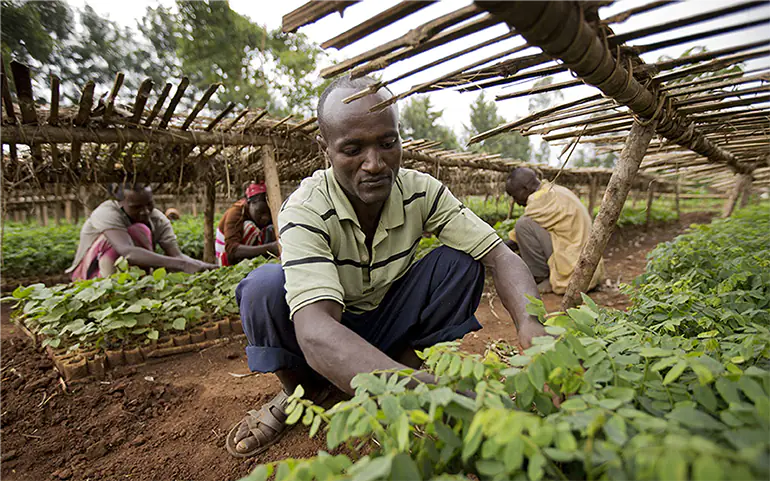Borderless mobilization for the environment
Whereas countries of the South are very directly exposed to the impact of climate change, several donor-advised funds are engaged in developing new farming models and sustainable businesses.
How can we support local communities in testing and developing solutions that are both ecological and economical? This question frames the initiatives led by many Fondation de France donor-advised funds, which support the development of new practices that create hope, promote inhabitants’ autonomy and respect the environment.
A new model
This is very much how the Act for a Better Planet Foundation operates. It was created in late 2019 by Laurent Silvestri, a young entrepreneur in the telecoms sector, passionate about biodiversity. The foundation chose to focus on Madagascar, by supporting nonprofit Manao Manga which promotes a circular economy mindful of natural resource usage. “Developing viable economic activity over the long term by consuming and destroying less resources, especially wood, means leaving behind a subsistence model and having a future again,” states Laurent Silvestri. In practical terms, the nonprofit has set up a plastic waste salvage scheme, in which plastic is sorted and re-used in the production of furniture and fertilizers. It offers micro credit for the sale of energy-efficient cookstoves. The project has two benefits, it avoids logging wood, and reduces deforestation. In two years, 400,000 trees have been saved!” Manao Manga also coordinates a program for replanting 50 million trees, a forest designed to both restore biodiversity and provide energy and food resources to local people. It has also launched a pedagogical farm to promote permaculture: “Each of these elements is linked to an approach of training and involvement from inhabitants,” highlights Laurent Silvestri. Beyond the transformation of practices, the true challenge is the revolution in people’s minds, over several generations.”

Biodiversity and agriculture, on and same fight
Some 10,000 km or so away from Madagascar, the approach of nonprofit Cœur de Forêt (Heart of the Forest), in Bolivia, is similar. Supported by four donor-advised funds – Fondation Denis & Fils, Fondation Une goutte d’eau pour notre planète (A Drop of Water for our Planet), Fondation Léa Nature, Fondation Nature et Découvertes – Cœur de Forêt is based in the Las Yungas region, between the Andes and Amazonia, which constitutes a wealth of extraordinary biodiversity.
For several years, traditional polyculture has given way to the culture of cocoa. Based on burning land, which destroys entire swathes of the forest, this intensive practice impoverishes the soil, generates landslides and pollutes waterways. “To encourage local producers to change their practices, they need viable and lasting financial resources,” explains Eugénie Saintipoly, head of the Fondation Denis & Fils. The foundation has engaged in reforestation with producers, by combining forest, fruit and flower species (such as coffee, citrus fruit, hibiscus) which can be commercialized. In addition, beekeeping equipment and training for 70 farmers meant that 2.5 tonnes of honey could be sold.” Once again, this is an alternative economic model, which protects ecosystems better “and which addresses the aspirations of new generations of farmers, who are increasingly conscious of environmental issues,” notes Eugénie Saintipoly.
Building a future
Agricultural practices are key in countries in the South, but other industry sectors could also provide leverage for environmental protection. For example, the building sector is at the heart of Fondation Setec’s initiatives. The projects it supports in Senegal and Cameroon offer alternatives to using concrete, a very energy-intensive material, which consumes large quantities of sand and does not perform well in terms of insulation. “The project led by nonprofit Nio Far in Senegal is based on using earth, straw and laterite. In Cameroon, nonprofit Ani-International uses raffia and bamboo, materials that are harvested locally,” explains Marie Hommeau, a facilitator at Fondation Setec. The projects supported also have a strong social element. First, because of the building’s purpose: building a school, a House of the Environment, an environmentally friendly unit for the transformation of cassava. Some of these constructions or renovations will host not-for-profit projects for local people. And second, because pedagogical building sites are being set up. “In this way, the Nio Far project is carried out with input from young people no longer in education, who are retraining by building... a training center! ”

